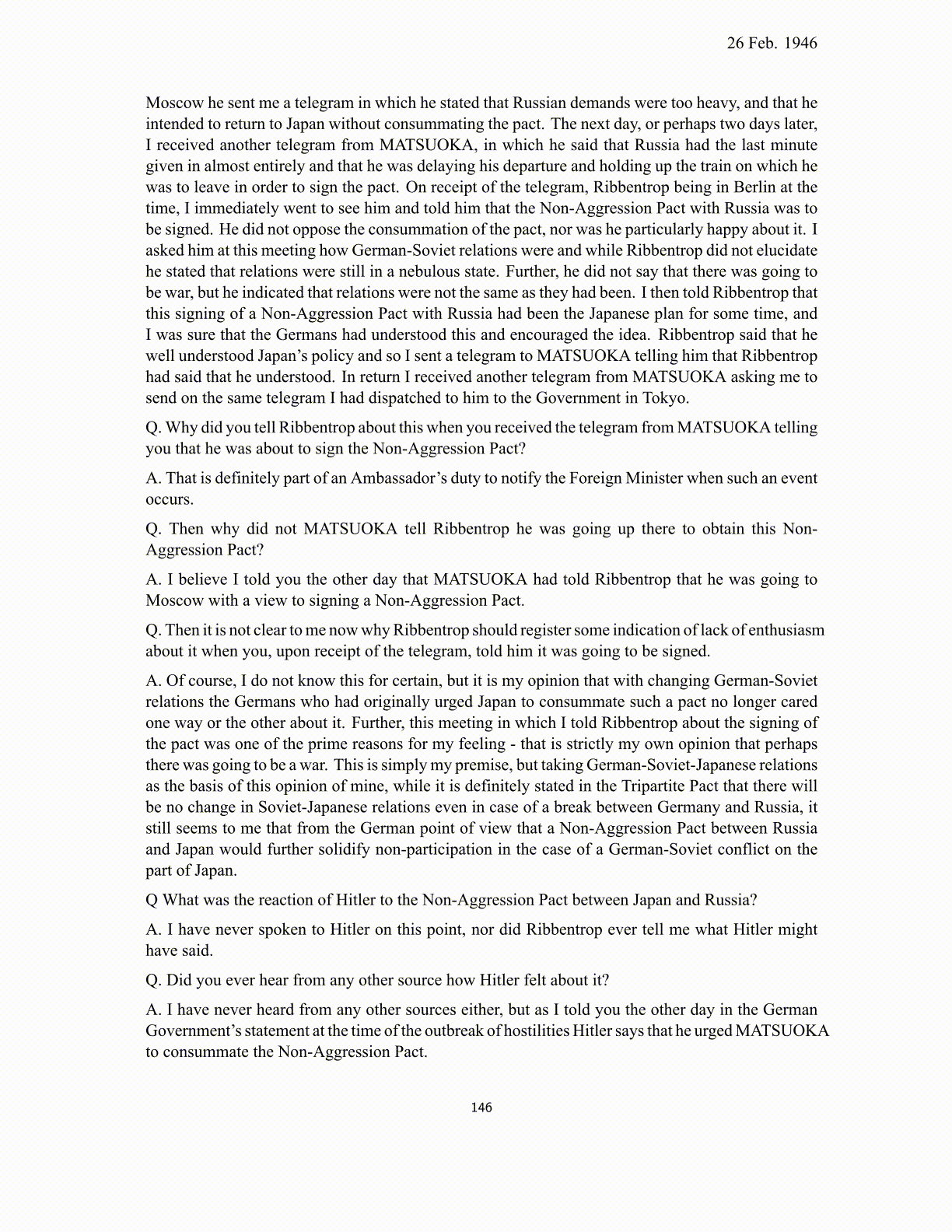
26 Feb. 1946 Moscow he sent me a telegram in which he stated that Russian demands were too heavy, and that he intended to return to Japan without consummating the pact. The next day, or perhaps two days later, I received another telegram from MATSUOKA, in which he said that Russia had the last minute given in almost entirely and that he was delaying his departure and holding up the train on which he was to leave in order to sign the pact. On receipt of the telegram, Ribbentrop being in Berlin at the time, I immediately went to see him and told him that the Non-Aggression Pact with Russia was to be signed. He did not oppose the consummation of the pact, nor was he particularly happy about it. I asked him at this meeting how German-Soviet relations were and while Ribbentrop did not elucidate he stated that relations were still in a nebulous state. Further, he did not say that there was going to be war, but he indicated that relations were not the same as they had been. I then told Ribbentrop that this signing of a Non-Aggression Pact with Russia had been the Japanese plan for some time, and I was sure that the Germans had understood this and encouraged the idea. Ribbentrop said that he well understood Japan’s policy and so I sent a telegram to MATSUOKA telling him that Ribbentrop had said that he understood. In return I received another telegram from MATSUOKA asking me to send on the same telegram I had dispatched to him to the Government in Tokyo. Q. Why did you tell Ribbentrop about this when you received the telegram from MATSUOKA telling you that he was about to sign the Non-Aggression Pact? A. That is definitely part of an Ambassador’s duty to notify the Foreign Minister when such an event occurs. Q. Then why did not MATSUOKA tell Ribbentrop he was going up there to obtain this Non- Aggression Pact? A. I believe I told you the other day that MATSUOKA had told Ribbentrop that he was going to Moscow with a view to signing a Non-Aggression Pact. Q. Then it is not clear to me now why Ribbentrop should register some indication of lack of enthusiasm about it when you, upon receipt of the telegram, told him it was going to be signed. A. Of course, I do not know this for certain, but it is my opinion that with changing German-Soviet relations the Germans who had originally urged Japan to consummate such a pact no longer cared one way or the other about it. Further, this meeting in which I told Ribbentrop about the signing of the pact was one of the prime reasons for my feeling - that is strictly my own opinion that perhaps there was going to be a war. This is simply my premise, but taking German-Soviet-Japanese relations as the basis of this opinion of mine, while it is definitely stated in the Tripartite Pact that there will be no change in Soviet-Japanese relations even in case of a break between Germany and Russia, it still seems to me that from the German point of view that a Non-Aggression Pact between Russia and Japan would further solidify non-participation in the case of a German-Soviet conflict on the part of Japan. Q What was the reaction of Hitler to the Non-Aggression Pact between Japan and Russia? A. I have never spoken to Hitler on this point, nor did Ribbentrop ever tell me what Hitler might have said. Q. Did you ever hear from any other source how Hitler felt about it? A. I have never heard from any other sources either, but as I told you the other day in the German Government’s statement at the time of the outbreak of hostilities Hitler says that he urged MATSUOKA to consummate the Non-Aggression Pact. 146